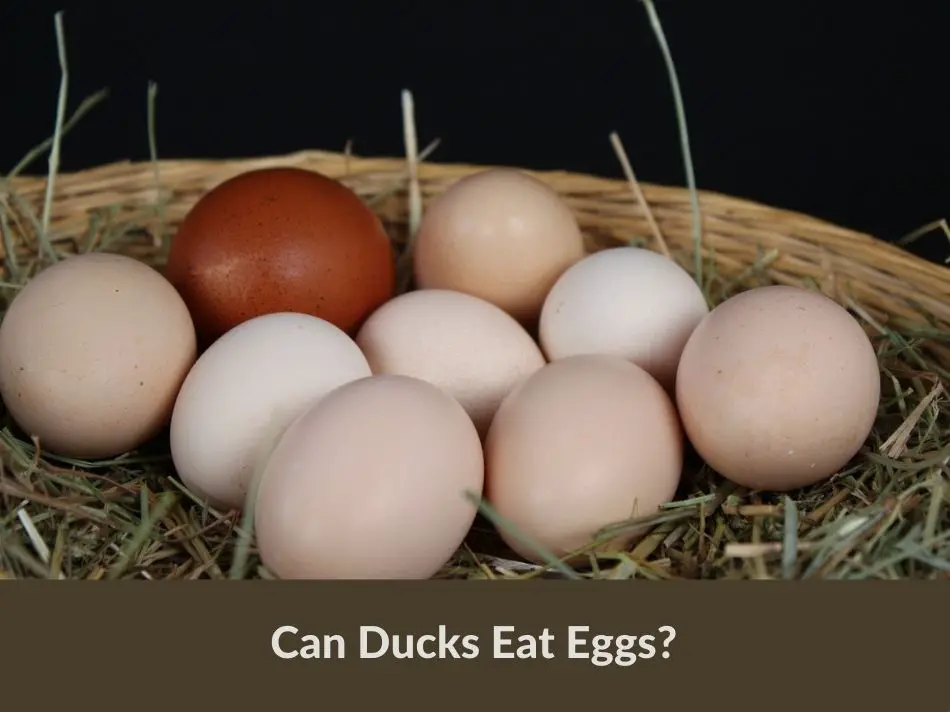Ducks are omnivores and have a varied diet that depends largely on their habitat and available resources. Their diet can range from small fish and insects to a variety of plants and seeds. In a domestic setting, ducks might be fed with commercial duck pellets, grains, vegetables, and worms. But, can ducks eat eggs?
Yes, ducks can eat boiled or scrambled eggs in moderation. Eggs can be a source of essential proteins and nutrients for ducks. It’s not uncommon for ducks in the wild to occasionally consume eggs of other birds if they find them.
In this article, readers will gain a comprehensive understanding of whether ducks can consume eggs, the frequency of feeding eggs to ducks, and whether ducklings can be fed with eggs. Insights related to the common practices of caretakers and park visitors feeding ducks will also be discussed.
How Often Can I Feed My Ducks Eggs?
While eggs are nutritious, they should not be a staple in a duck’s diet. Caretakers might choose to feed their ducks eggs once a week or even less frequently. Offering eggs too often can result in an unbalanced diet.
It’s also crucial to remember that the primary food for ducks should be specially formulated duck pellets or their natural diet depending on their habitat. This provides them with the necessary nutrients to maintain good health.
Can Ducklings Eat Eggs?
Yes, ducklings can eat eggs, particularly when they are finely chopped or mashed. In fact, eggs can provide a good protein boost for growing ducklings. When caretakers or breeders are raising ducklings, they often include boiled egg yolks in their initial feed to give them a strong start in life.
That said, it’s pivotal to introduce eggs as a part of a well-balanced diet tailored for ducklings, which usually includes starter crumbles formulated for young waterfowl.
Are Eggs Healthy For Ducks?
Eggs are considered a powerhouse of nutrition, not just for humans but also for many animals, including ducks. Here’s a detailed look into what eggs have to offer for our feathered friends:
- Proteins: Eggs are a rich source of high-quality proteins, which are essential for muscle development, feather growth, and overall metabolic functions in ducks. The amino acids found in eggs can support tissue repair and maintenance, making them especially beneficial during molting or for growing ducklings.
- Fats: The yolk of an egg contains healthy fats, which provide a concentrated source of energy for ducks. These fats are crucial for sustaining their energy levels, especially during colder months or during periods of heightened activity.
- Vitamins: Eggs are packed with a variety of vitamins, particularly B vitamins like riboflavin and pantothenic acid. These vitamins play vital roles in energy production and the synthesis of essential compounds in a duck’s body.
- Minerals: Ducks can benefit from the essential minerals present in eggs, such as selenium, zinc, and phosphorus. These minerals support various physiological functions, from bone health to antioxidant defenses.
- Choline: This nutrient, found abundantly in eggs, is vital for brain health and the formation of neurotransmitters. For ducks, it can aid in maintaining optimal neurological functions.
- Lutein and Zeaxanthin: These are potent antioxidants present in eggs, known to support eye health. While ducks primarily rely on their vision for various activities, including foraging and avoiding predators, these compounds can play a role in maintaining optimal eye health.
- Omega-3 Fatty Acids: Some eggs, especially those from ducks that consume a diet rich in omega-3 sources, can contain these beneficial fatty acids. Omega-3s support cardiovascular health, brain function, and have anti-inflammatory properties.
How To Feed Eggs To Ducks
Feeding eggs to ducks requires some careful steps to make it a safe and nutritious treat. Follow these instructions to provide ducks with eggs in the most beneficial manner:
- Choose Fresh Eggs: Begin with fresh eggs, preferably those free from any cracks or visible defects.
- Boil or Scramble: Cooking the eggs is crucial. Boil them until both the yolk and the white are fully cooked. Alternatively, you can scramble them without any additives like salt or butter.
- Cool Down: Once cooked, let the eggs cool down to room temperature. This step is important to avoid any potential burns or discomfort for the ducks.
- Chop or Mash: Break the eggs into smaller, bite-sized pieces. If you’re feeding ducklings, it’s best to mash the eggs into finer bits to make it easier for them to eat.
- Serve in a Shallow Dish: Use a dish or tray that’s easily accessible to ducks. Spread out the egg pieces to allow multiple ducks to feed without crowding.
- Limit Quantity: Remember, eggs are a treat and not a main course. Offer only as much as the ducks can consume in a short period, preventing any leftovers which could attract pests or rot.
- Provide Clean Water: Always have a clean source of water available for the ducks when feeding them. Ducks like to sip water as they eat, and it aids in digestion.
More Foods Ducks Can Eat
Ducks, being omnivores, can safely consume a variety of foods when offered in moderation. These foods can serve as treats, supplementing their regular diet and providing them with a mix of nutrients.
Below is a list of more foods ducks can eat:
Remember to view our list of duck-friendly human foods.
Conclusion
Considering all these nutritional components, it’s clear that eggs can offer a lot for ducks in terms of health and wellness. Yet, while they’re nutritionally dense, it’s essential to treat eggs as a supplement to a duck’s primary diet, rather than a staple.
This approach will help in providing ducks with a balanced dietary intake, making the most of what eggs have to offer without overshadowing the other crucial nutrients ducks need from their regular feed or natural foraging.
Disclaimer: The information in this article is for informational purposes only. I'm not an expert or a veterinarian.


